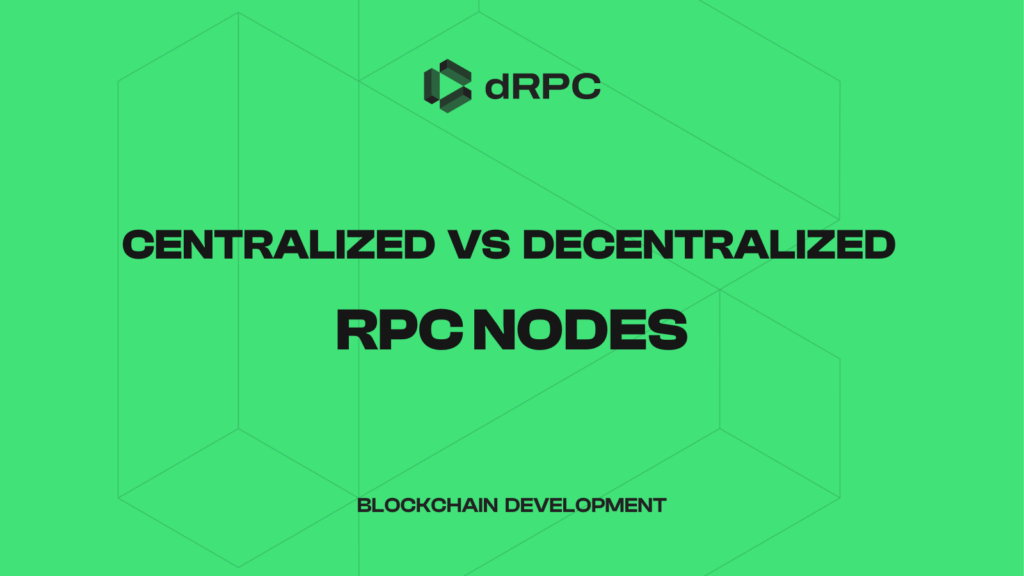RPC nodes can be either centralized or decentralized.
This choice affects accessibility, reliability, and security.
Developers need to consider these factors when choosing the architecture.
Let’s look at the differences between centralized and decentralized RPC nodes to understand this important aspect of technical infrastructure.
Centralized vs. Decentralized RPC Nodes
Centralized RPC nodes are easy to use and offer control, which is convenient for developers. However, they lack the resilience and security of decentralized nodes.
Decentralized nodes distribute data across a network, reducing the risk of failure. They can handle high traffic better than centralized nodes, which may face bottlenecks.
In terms of security, decentralized nodes are more secure against attacks. While centralized nodes may have lower initial costs, they can become more expensive to scale in the long run.
In the era of Web3 and decentralized applications, developers prefer decentralized RPC nodes for their speed, reliability, and customization, despite requiring more effort to set up and manage.
Centralized RPC Nodes
Definition and Functionality
Centralized RPC nodes usually refer to a single server or a network of servers managing all requests and responses for applications in a blockchain network. These nodes are the main interaction point for developers to access blockchain data, run smart contracts, and handle transactions.
On the other hand, decentralized RPC nodes are a distributed system of nodes in different locations. These nodes collaborate to offer speed and reliability, enabling applications to connect to multiple nodes at once.
Advantages of decentralized RPC nodes include improved access control by spreading workload across multiple nodes and reducing the risk of failure. Developers can also customize decentralized nodes to meet their specific requirements. While centralized nodes work well for simpler applications, decentralized nodes are more robust and flexible for complex blockchain environments.
Transitioning from centralized to decentralized RPC nodes signals a move toward a more secure and efficient infrastructure in the Web3 era.
Advantages
Decentralized RPC nodes have many advantages over centralized ones. Developers can improve the reliability and security of their applications by using these nodes.
Decentralized RPC nodes create a distributed network that enhances infrastructure resilience, making it capable of handling more requests. This ensures that essential interactions on the blockchain network, like transactions and smart contracts, run smoothly.
Developers can also customize their RPC endpoints with decentralized nodes. This customization allows for more efficient testing and access control. In the web3 era, where speed and reliability are crucial in blockchain interactions, this level of control is important.
Moreover, decentralized RPC nodes help create a more decentralized ecosystem. They encourage collaboration among developers and RPC node providers to enhance overall infrastructure and support chain synchronization across multiple chains.
By connecting to decentralized RPC nodes, developers can ensure compatibility with various networks. This offers a stronger foundation for decentralized applications and services.
Disadvantages
Centralized RPC nodes have drawbacks. One concern is the risk of a single point of failure, impacting system reliability. This becomes more apparent when handling high request volumes, causing transaction delays.
Security is another issue. Centralized nodes are vulnerable to attacks, jeopardizing data confidentiality and integrity.
Decentralized RPC nodes, on the other hand, offer advantages like better customization and access control.
Using a decentralized network of RPC endpoints helps create a more dependable infrastructure, reducing vulnerabilities.
In the age of decentralized systems and web3 tech, transitioning to decentralized RPC nodes is crucial. This ensures faster and more reliable interactions on blockchain networks.
Use Cases in Industry
Decentralized RPC nodes are becoming popular in many industries as they offer better security and reliability compared to centralized ones.
Blockchain networks, for instance, heavily depend on RPC nodes for smooth interactions with smart contracts and data retrieval.
Developers in various fields use RPC nodes to link applications to blockchain networks, ensuring seamless transactions and data access.
By using RPC endpoints, developers can test applications, customize interactions, and control access in a decentralized setting.
Decentralized RPC nodes bring faster speeds, improved reliability, and better infrastructures, shaping the era of Web3.
In the world of self-hosted nodes, RPC providers are crucial for providing customized RPC endpoints that work with different chains, promoting decentralized infrastructure in distributed systems.
With decentralized RPC nodes, industries can securely and efficiently connect, synchronize, and access blockchain data.
Concerns on Centralization
Centralizing RPC nodes can be risky. It creates a single point of failure for requests. This can lead to network downtimes and vulnerabilities. These vulnerabilities could be exploited by malicious actors.
Lack of redundancy in centralized RPC nodes can cause delays or denial of service. Developers may face challenges when trying to interact with blockchain data or execute transactions.
Network resilience and security are compromised in centralized RPC nodes. Issues with the central server can disrupt the entire network and compromise data integrity.
Centralization limits access and control over network infrastructure. This restricts developers in customizing RPC endpoints and testing new functionalities.
Decentralizing RPC nodes can lead to a more reliable infrastructure for decentralized applications and smart contracts. It enhances the speed and reliability of interactions within the web3 ecosystem.
Decentralized RPC Nodes
Key Characteristics
Decentralized RPC nodes offer a more robust and secure infrastructure for blockchain interactions. These nodes provide developers with the ability to connect to the blockchain network through customized RPC endpoints, ensuring a reliable connection for their applications and smart contracts. Unlike centralized RPC nodes, decentralized RPC nodes allow for more control over data access, enabling developers to tailor their server settings for optimal performance.
While decentralized RPC nodes offer increased customization and security, developers may face challenges in ensuring the speed and reliability of these nodes due to their distributed nature. Despite these challenges, decentralized RPC nodes play a crucial role in the era of Web3 by providing a decentralized ecosystem for handling RPC protocol interactions, ensuring secure access to blockchain data, and fostering the development of decentralized applications.
By connecting to decentralized RPC nodes, developers can leverage the benefits of self-hosted nodes, sync their applications with the blockchain, and control access to their data with enhanced access control mechanisms.
Benefits
Decentralized RPC nodes have lots of benefits for developers and applications in the blockchain world.
When developers use decentralized RPC nodes, they can have more reliable and faster API calls and interactions with the blockchain.
These nodes also let developers customize and test RPC endpoints, giving them more control over their infrastructure. Unlike centralized RPC nodes, decentralized ones offer better access control and security, lowering the risk of failures in one place.
Moreover, decentralized RPC nodes create a more connected and strong network for blockchain transactions and smart contracts.
Challenges
Challenges with centralized RPC nodes:
- Potential bottlenecks
- Single points of failure
- Data privacy and security concerns
These challenges can slow down interactions between applications and the blockchain.
Decentralized RPC nodes offer a solution:
- Spread infrastructure across multiple nodes
- Reduce bottlenecks and failure risks
- Improve overall system reliability and security
Decentralized nodes create a safer environment for data transactions, smart contracts, and API calls. Developers can customize RPC requests and test applications securely. This ecosystem enhances efficiency and security for remote procedure calls in the blockchain realm.
Comparison of Centralized and Decentralized RPC Nodes
Performance Metrics
Performance metrics are important for evaluating the efficiency of RPC nodes. RPC nodes can be centralized or decentralized.
Metrics like response time, uptime, and throughput are key indicators. These metrics help determine how well RPC nodes work in a network.
By tracking these metrics, developers can see how fast and reliable RPC nodes are. Developers can make better decisions when choosing nodes for specific uses.
Speed, reliability, and customization options are important factors. These factors influence the choice of RPC node providers. Choosing the right provider ensures smooth connectivity and access control in the blockchain world.
Understanding RPC nodes’ performance metrics is crucial in decentralized systems and Web3 apps. It helps optimize infrastructure and improve user experience with blockchain and smart contracts.
Security Considerations
Using centralized RPC nodes comes with a risk: a single point of failure. If one of these nodes is compromised, it could disrupt service or allow unauthorized access to sensitive data.
On the other hand, decentralized RPC nodes offer better security. Data and interactions are spread across multiple nodes, reducing the impact if one is compromised.
Developers can enhance RPC node security in a decentralized network by:
- Implementing access control mechanisms
- Encrypting data transmission
- Conducting regular security audits
Customizing RPC endpoints and setting strict access controls help restrict access to sensitive resources. Testing for vulnerabilities and encrypting data further boosts network security.
In the era of decentralized ecosystems and Web3 applications, securing RPC nodes is essential for the integrity of blockchain interactions. Connecting to reliable RPC endpoints ensures fast and reliable interactions while minimizing security risks in the decentralized ecosystem.
Cost Analysis
Using centralized RPC nodes can be more expensive than decentralized RPC nodes. Centralized nodes require dedicated servers, increasing costs. In contrast, decentralized nodes are spread across a network, reducing the load on one server and offering cost-effective solutions.
Factors to consider in cost analysis include customization, testing, access control, and infrastructure needs when choosing between centralized and decentralized RPC nodes. Speed, reliability of RPC endpoints, compatibility with various blockchain networks, and the decentralized ecosystem also influence the cost-effectiveness of decentralized RPC nodes.
Selection Guidelines for RPC Nodes
When choosing RPC nodes for a decentralized network, developers need to assess their security and reliability. Factors like speed and reliability of RPC endpoints are important for smooth interactions with the blockchain network.
Custom RPC endpoints offer flexibility for developers to tailor their requests. This is crucial for testing smart contracts and ensuring data accuracy.
In decentralized ecosystems, the choice between centralized and decentralized RPC nodes depends on the required level of access control. Centralized nodes may be convenient, but decentralized nodes offer a more secure infrastructure for interacting with blockchain data.
Examining RPC node providers such as DRPC and Base for compatibility with different chains and customization options can help developers make informed decisions for their decentralized applications.
The selection of RPC nodes is vital for establishing a dependable RPC layer that seamlessly connects applications to the blockchain network.
Best Practices for Utilizing Decentralized RPC Nodes
Organizations can enhance the security of decentralized RPC nodes by implementing access control and customization for rpc endpoints. This helps maintain optimal performance levels.
Developers can achieve this by using self-hosted nodes or connecting to virtual servers. They should also conduct thorough testing to validate data integrity and secure rpc endpoints.
To manage costs effectively in a decentralized network environment, organizations can opt for rpc node providers that offer customizable plans based on usage or transaction volumes.
Optimizing decentralized rpc nodes for high availability and reliability in business operations involves efficiently syncing data across blockchain nodes and connecting to reliable rpc endpoints.
By leveraging compatible rpc protocols and ensuring reliable and scalable infrastructure, organizations can achieve speed and reliability in their interactions within the decentralized ecosystem.
The team at dRPC emphasizes the importance of a secure and decentralized infrastructure in today’s modern era, focusing on decentralized web3 stacks.
—————————————————————–
Let’s keep in touch!
Stay informed about the latest developments in RPC infrastructure by signing up for the dRPC blog.
Scheduling a demo?
For a deeper dive into how decentralized or hybrid RPC solutions can benefit your projects, consider booking a meeting with a dRPC.org on this link to explore tailored offerings that meet your specific needs.
Premium gift cards and conference tickets?
Follow us at (https://x.com/drpcorg) and access free Premium credit and conference ticket raffles. Follow now!


